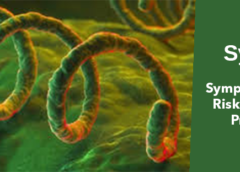Syphilis is a bacterial infection which is typically transmitted by sexual contact. The disease begins as a painless sore-usually on your penis, rectum, or mouth. Syphilis spreads from one person to another person by skin or mucous membrane contact with these sores. Here we;ll know the Symptoms, Causes, Risk Factors and Prevention of the Syphilis.
If it is not treated then it can seriously damage the heart, brain or other organs and can be life-threatening. Syphilis may also be spread from moms to unborn babies.
Syphilis Symptoms
Syphilis develops in stages, with each stage symptoms is different. But the stages can overlap, and the symptoms are not always the same. You can become infected with syphilis for years and may not experience any symptoms.
Primary syphilis
A slight sore, called a chancre, is the first symptom of syphilis. The sore shows up at the stage where the bacteria entered the body. Although most people diagnosed with syphilis develop one chancre only, some people develop many.
Usually, the chancre grows about three weeks after exposure. Many people with syphilis may not feel the chancre because it is usually painless, and might be covered within the vagina or rectum. Within three to six weeks the chancre will recover by itself.
Secondary syphilis
After a few weeks of the original chancre healing, you can experience a rash that begins on your trunk but eventually covers your entire body — including the palms of your hands and the sole of your feet. Typically this rash is not itchy and may be followed by warts like sores in your mouth or genital region. There will be hair loss, muscle aches, a headache, a sore throat and swollen lymph nodes in certain cases. Such symptoms can disappear within weeks or can come and go regularly for as long as a year.
Latent syphilis
If you are not treated for syphilis, because you have no symptoms, the disease progresses from the second stage to the secret (latent) stage. The latent stage could last for years. Signs may never return or may advance to the third stage of the illness.
Tertiary syphilis
Around 15 to 30 per cent of people infected with syphilis who don’t get treatment will experience complications known as late syphilis. The illness will damage your brain, nerves, eyes, heart, blood vessels, liver, bones, and joints in the late stage. These problems can arise several years after the original, untreated infection.
Congenital syphilis
Women who have syphilis, babies of there may become infected during birth or via the placenta. Most newborns with congenital syphilis have no symptoms but some have a rash on their hands’ palms and feet’s soles. Later signs and symptoms can include deafness, deformities in the teeth and saddle nose — where the nose bridge breaks.
Babies born with syphilis can also be born too early, born dead or die after birth.
When to see a doctor
If you or your child experiences any unusual discharge, sore or rash, call your doctor — especially if it occurs in the groin area.
Syphilis Causes
Syphilis is caused by a bacteria, called Treponema pallidum. During sexual activity, the most common route of transmission is by contact with the sore of an infected person. Via small cuts or abrasions in your skin or mucous membranes, the bacteria enter your body. Syphilis is contagious during its first and second stages, and sometimes in the early latent period.
Less commonly, syphilis can spread to their babies during pregnancy or childbirth by direct unprotected close contact with an active lesion, or through infected mothers.
It is not possible to spread syphilis by using the same toilet, bathtub, clothes or eating utensils, or from door nozzles, swimming pools or hot tubs.
When it is healed, syphilis does not recur by itself. However, if you have contact with somebody’s syphilis sore you may become reinfected.
Risk factors
You face a high risk of acquiring syphilis if:
- You Engage in unprotected sex
- You Have sex with multiple persons
- You are a man who has sex relation, other men
- You are infected with HIV, the virus which causes AIDS
Complications
Syphilis can cause harm to the body, without treatment. Syphilis also raises the risk of infection HIV, which may cause complications during pregnancy for women. Treatment will help avoid potential damage but the damage that has already occurred cannot be healed or reversed.
Small bumps or tumours
Called gummas, in the late stage of syphilis, these bumps may grow on your skin, bones, liver or any other organ. Gummas usually vanish after antibiotic therapy.
Neurological problems
Syphilis may cause a variety of problems with your nervous system, including:
- Headache
- Stroke
- Meningitis
- Hearing loss
- Visual issues, including blindness
- Dementia
- Male Sexual dysfunction
- Bladder incontinence
Pregnancy and childbirth complications
You can transmit syphilis to your unborn baby if you are pregnant. The risk of miscarriage, stillbirth or death of your infant within a few days of birth by congenital syphilis significantly increased.
Prevention
There is no Syphilis vaccine. Follow some recommendations to help avoid the spread of syphilis:
- Abstain or be monogamous: The only sure way of stopping syphilis is not having (abstain from) sex. The next best thing is to have a mutually monogamous relationship where both parties just have a relationship with each other and no one gets infected.
- Use a latex condom: Condoms will reduce the risk of syphilis, but only if the condom cover syphilis sores.
- Avoid recreational drugs: Alcohol abuse or other substances can hamper your judgment and lead to inappropriate sexual activities.
Screening for pregnant women
People may get an infection from syphilis and does not know that. Health authorities recommend that all pregnant women are tested for the disease because of the potentially fatal effects syphilis may have on unborn children.

Leave a Reply
You must be logged in to post a comment.